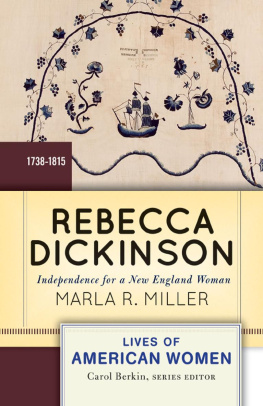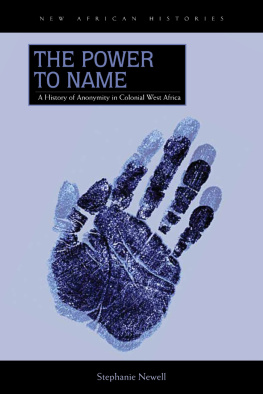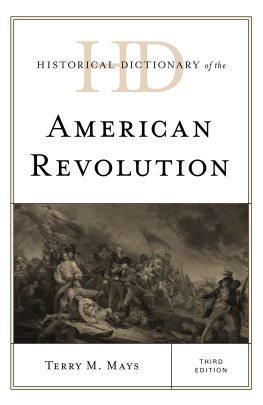ACKNOWLEDGMENTS
I owe an enormous debt to the many individuals and institutions whose support enabled me to write this book, and I am pleased to have the opportunity to thank them. I had to travel south to discover the fascination of New England; it was in classes and conversations with Stephen Innes at the University of Virginia that I first became acquainted with the Puritans and with many of the questions I have tried to grapple with here. Dorothy Ross and Peter Onuf also provided scholarly guidance and useful criticism of the dissertation on which this book is based. I benefited as well from the amazing generosity of other scholars in the field of early America, who took the time to discuss their work with me and to read and comment on parts of the book or papers that became the basis of chapters, including Joyce Appleby, John Brooke, Drew Cayton, Robert Dalzell, Stephen Foster, Christine Heyrman, Karen Kupperman, Cathy Matson, Ed Perkins, Alan Taylor, Daniel Vickers, and Gordon Wood. A careful readingand trenchant commentsfrom John McCusker saved me from embarrassing errors. Thorough reports from two anonymous readers at Cornell University Press gave me excellent ideas for revisions.
Here in Columbus, participants in the Ohio Seminar for Early American History and Culture, especially Carla Pestana, Randy Roth, Saul Cornell, and Les Benedict, suggested improvements. Mitch Golden heroically read each draft of the manuscript in progress, and Geoff Plank read and proofed the final version. Lisa Flormans sharp eye helped me make some necessary cuts, and Trisha Craig and Tom Klubock solved some knotty problems with the Introduction. Brad Campbell offered shrewd advice in the homestretch. My research assistant, Keith McCanless, helped with the tedious task of checking footnotes, and Margaret Popovich drew the two new maps. Thanks are also due to my wonderful colleagues in History at Ohio State, especially Ken Andrien, Michael Berkowitz, Steve Conn, Mark Grimsley, Birgitte Soland, and Katie Swett.
Many institutions have supported my research and writing, beginning with the Thomas Jefferson Foundation and the University of Virginia. The American Historical Association, the Brown University History Departments John Lax Fund, the National Endowment for the Humanities, and the Virginia Society of the Cincinnati provided crucial financial assistance. In addition, fellowships from the Huntington Library in San Marino, California, the John Carter Brown Library at Brown University, the American Antiquarian Society in Worcester, Massachusetts, and the Massachusetts Historical Society in Boston enabled me not only to use their fine collections but also to participate in the rich intellectual life that each institution fosters. Although the staffs at all these libraries were uniformly helpful, Norman Fiering of the John Carter Brown Library and Conrad Wright and Peter Drummey of the Massachussetts Historical Society deserve special thanks; they have supported this project since I was a very green graduate student, and their advice and encouragement have meant a great deal. Many thanks also to the chair of the History Department at Ohio State, Michael Hogan, and to the College of Humanities for its generous program of travel grants and research leave.
Aside from these institutional debts, I am pleased to acknowledge many personal debts. H. D. and Martha Maxwell, Laura Maxwell, Tracy Vietze, Jim and Gilda Newell, Sam and Judy Merra, and Ed and Judy Perkins all housed me on various research trips. Susan Danforth at the John Carter Brown Library, Chris Steele, Kate Viens, and Anne Bentley of the Massachusetts Historical Society, and Daniel Truckey and Steve Rice at the Connecticut Historical Society helped me select and process the illustrations. Peter Agree, my editor at Cornell, offered extraordinary support throughout; his patience and confidence helped turn a difficult process into a pleasure.
Finally, I offer special tribute to my family, to whom this book is dedicated. My parents, Jim and Peg, instilled a love of history and learning in all of their children; their financial support made my education possible, and their love and interest kept my spirits up at every stage. My brothers, Jim, John, and Pete, fielded countless late-night phone calls about late papers and writers block, read my rough drafts, and were always my most enthusiastic audience.
MARGARET ELLEN NEWELL
Columbus, Ohio
INTRODUCTION
THE PROBLEM OF ECONOMIC DEVELOPMENT IN COLONIAL NEW ENGLAND
For much of this century the United States has represented the global archetype of successful economic development. Americas prosperity appears all the more striking in comparison with the struggles of so-called developing nations to diversify their economies, industrialize, and secure greater economic autonomy. The challenges that countries such as India, Nigeria, and Brazil face in reducing their neocolonial dependence on shifting First World markets and meeting domestic demand for consumer goods without incurring crippling trade deficits or hyperinflation seem foreign to Americas experience. In much of the Third World, politicians and entrepreneurs face the difficult task of establishing new industries in the context of a competitive global economy in which more developed nations have a head start. They know that foreign investment capital often comes at a high pricethe sacrifice of some local sovereignty. And even those nations that most eagerly embrace the market must cope with the mobility, diversity, and other challenges to traditional social order and ethics that often accompany capitalism. In advising such client nations, the World Bank and other international aid organizations treat Americas trajectory as the normative path to membership in the First World.
Yet for nearly two centuries mainland British America was an underdeveloped, dependent outpost of one of the most powerful commercial empires in Europe. England had a head start on commercial and industrial development, and it made the most of this advantage in its relationship with the coloniesa relationship predicated on colonial economic and political dependence. In the seventeenth century, most English men and women viewed the colonies (when they thought of them at all) as objects of exploitation. America was seen as a staging ground for economic experiments; a source of cheap land, raw materials, and staple crops, not to mention patronage positions; and an outlet for such surplus members of the populace as younger sons, underemployed workers, religious dissidents, and criminals. By the eighteenth century, the North American colonies had assumed prominence in a global British mercantile system that cast the southern colonies in the role of staple producers, the northern settlements in the role of provisioner to more valuable but less self-sufficient colonies in New-foundland and the Caribbean, and both regions as markets for British manufactures. Many economic actors in the colonies prospered from these arrangements. Still, even this more reciprocal vision of colonialmetropolitan relations presumed the subordination of colonial interests to the superior claims of the mother country. English regulatory policy between 1660 and 1774 explicitly aimed to limit colonial economic development in order to secure for the metropolis a monopoly of key industries, trades, and financial services.









